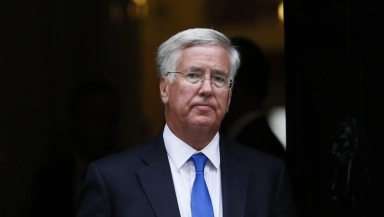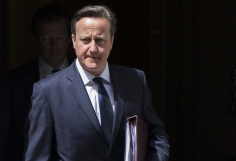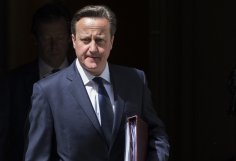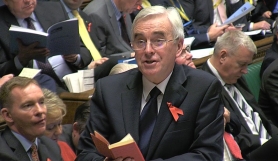
Britain's government has yet to drum up the support it needs to win parliamentary approval for launching air strikes against Islamic State militants in Syria, defence minister Michael Fallon said on Sunday.
Prime Minister David Cameron has said it is time to join the air strikes against Islamic State, which claimed responsibility for killing 130 people in Paris earlier this month.
On Thursday Cameron told the Commons that "we face a fundamental threat to our security" and doing nothing "could make the UK more of a target for ISIL attacks".
But several of his own Conservative Party and some lawmakers in the opposition Labour Party are wary of entering into another war in the Middle East after Western intervention in Iraq, Afghanistan and Libya failed to bring stability to the region.
Fallon said the government was holding talks with Labour lawmakers and, while it would like a vote to take place this week, it was still building the case for extending air strikes beyond Iraq, where it already supports U.S.-led attacks.
"We'd like to have a vote for military action but we've got to keep building the case," Fallon told the BBC's Andrew Marr show.
Asked whether the government had got the votes needed to get parliamentary approval for the air strikes, Fallon said: "Not yet, we are working at it and we need to keep working at it because there are lots of questions about this."
Media reported the vote could be held on Wednesday, but Cameron says he will not ask parliament until he can count on its approval, to avoid a repeat of the damaging defeat in 2013 over strikes against Syrian President Bashar al-Assad's forces.
Fallon said opinion "was beginning to shift" over the action. Some members of parliament who were reluctant to launch further military action in the Middle East now feel it is needed to protect Britain from attacks like the ones staged in Paris.

Others, however, have questions they feel Cameron has not answered and have yet to change their minds.
Labour leader Jeremy Corbyn told the same programme: "I don't think it [air strikes on Syria] will solve the problem."
He said he feared there would be civilian casualties despite the use of precision bombing and that a political settlement was the only way to bring peace to Syria, which has been locked in a civil war for more than four and a half years.
Corbyn, a veteran anti-war campaigner, is facing deep divisions in his Labour Party over the vote.
He said he had not decided yet whether to use a "party whip" to maintain parliamentary discipline or to allow his party members to vote according to their consciences on the action.
If he does not force opposition members to vote with him against the action, the government could get enough votes. If not, Fallon said it would be "hugely damaging" to Britain's reputation if the government failed to win parliamentary approval.
Last week the Archbishop of Canterbury, Justin Welby, appeared to come out in favour of military action. In his speech to General Synod on Tuesday he said it is "not a war against Islam", but "there will be aspects that may involve the use of armed force in a quasi-policing form. We will differ over when that is right and wrong."
Synod then voted in favour of supporting military action only when intended to help refugees flee safely from the region. Welby said that intervention "must use some kind of forceful response".
Additional reporting by Reuters
















